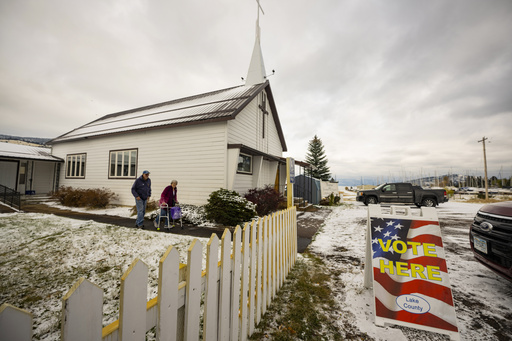
OKLAHOMA CITY, Okla. — A recent study highlights significant barriers faced by Native Americans when it comes to voting on tribal lands, leading to noticeable declines in their electoral participation, especially during presidential elections.
Released on Tuesday, the research by the Brennan Center for Justice focused on 21 states housing federally recognized tribal lands with over 5,000 residents, where more than 20% identify as American Indian or Alaska Native. From 2012 to 2022, it revealed a discrepancy in voter turnout, showing that participation in federal elections was 7% lower during midterms and 15% lower in presidential elections among those living on tribal lands compared to their non-tribal counterparts in the same states.
Prior studies have indicated that communities of color tend to have higher voter turnout in areas where they form the majority. However, the latest findings from the Brennan Center illustrate a stark contrast within tribal lands, where the concentration of Native Americans correlates with diminished voter turnout. Chelsea Jones, a researcher involved in the study, noted that this reflects a deeper issue affecting Native American communities.
Jones points out that numerous obstacles may be particularly difficult to overcome in predominantly Native areas due to insufficient polling places and limited access to early or mail-in ballots. The challenge is exacerbated by many residents on tribal lands lacking traditional addresses, with some not having street names or house numbers, making mail-in voting a substantial hurdle. This has led to reliance on P.O. boxes for receiving ballots, which some jurisdictions do not accommodate for ballot mailing.
Moreover, the study highlights the lengthy distances Native Americans have to travel to reach polling places combined with inadequate public transportation options, presenting further challenges for voters. Jones remarked on the gravity of these barriers, explaining how requiring individuals to travel up to 100 miles to cast a vote places them in a severely restrictive situation.
Additionally, Jones indicated that Native American voters have encountered difficulties in using tribal identification to vote in certain jurisdictions, including areas where it is permitted by law. These compounding issues not only hinder voting access but may also foster distrust in the electoral system, further affecting turnout rates.
The Brennan Center’s findings also point to an ongoing concern about the lack of reliable data regarding Native American voting patterns. Jones remarked on the significant data inequalities involved in researching Indigenous political participation.
Many Native American communities are often overlooked in polling data; when included, their results may not accurately reflect broader voting trends, according to Dr. Stephanie Fryberg, who directs the Research for Indigenous Social Action & Equity Center. Fryberg emphasized that conventional polling methodologies often fail to accommodate the unique characteristics of Indian Country, hampering efforts to capture accurate political insights about these communities.
As a member of the Tulalip Tribe in Washington State, Fryberg, along with various Indigenous researchers, criticized a recent exit poll by Edison Research that claimed a high percentage of Native American voters supported Donald Trump. The small sampling size of 229 self-identified Native American voters was deemed insufficient for drawing reliable conclusions, especially since none were from tribal lands.
Fryberg remarked that these limitations overlook a vital perspective within the Indigenous voting community. The Indigenous Journalists Association labeled the polling information as misleading, asserting that it contributes to widespread misinformation.
In response, Edison Research acknowledged the small sample size but maintained that the purpose of the survey was to represent the national electorate along with diverse demographic groups. They pointed out the potential margin of error with the sample size.
Fryberg argued that Native Americans have distinct political identities tied to their status as citizens of sovereign nations. She emphasized the need for researchers to address tribal membership and specific Indigenous populations when gathering data to ensure accurate insight into voting behaviors.
Both Fryberg and Jones advocate for improved data collection and voting opportunities for Native Americans, emphasizing the necessity of tailoring research and legislative efforts to meet the unique needs of these communities. Jones highlighted the importance of the Native American Voting Rights Act, a proposal that has struggled to pass through Congress, which aims to guarantee fair in-person voting options across tribal lands.
Jones concluded by stating that the barriers faced by Native American voters are specific to tribal lands, necessitating targeted solutions addressing these unique challenges.
